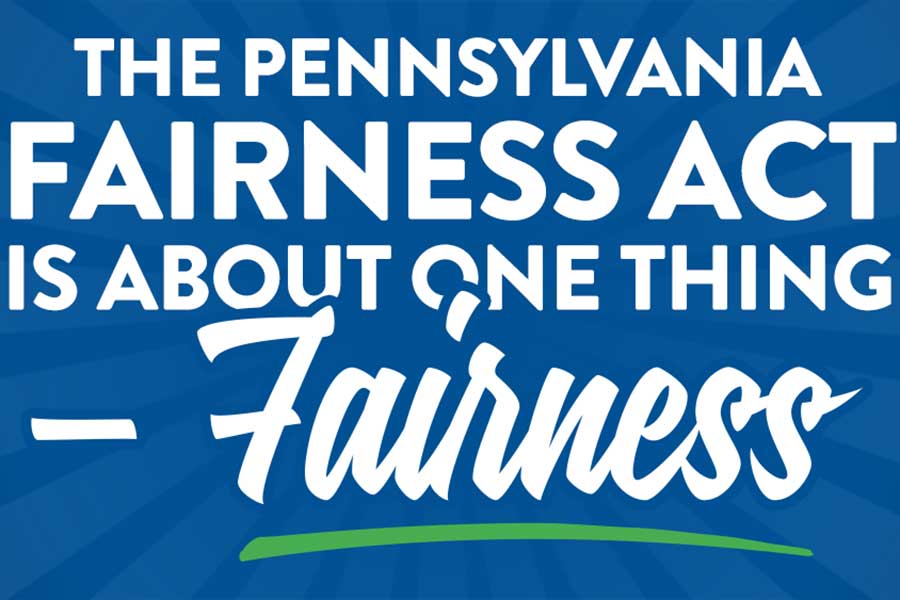Showing up to work late, regularly taking hour-long lunches or not completing your daily tasks could get you fired.
So could posting a picture with your same-sex partner — at least in much of the Keystone State.
Pennsylvania is one of 29 states without a blanket law preventing discrimination against the LGBTQ community in employment, housing and public accommodation. The push for statewide protections prompted Pennsylvania’s two out state representatives to hold a community forum this week.
State Reps. Malcolm Kenyatta and Brian Sims hosted “LGBTQ Civil Rights: The Pursuit of the Fairness Act” Wednesday at Congregation Rodeph Shalom, a synagogue in North Philadelphia. About 50 people gathered amid thunderstorms to learn more about House Bill 1404: LGBTQ Civil Rights Protection.
“In the spectrum of LGBT civil rights, from marriage equality to nondiscrimination laws, to hate-crimes laws, to antibullying laws, to comprehensive sex education, to access to medical care, there really are no laws in Pennsylvania that protect us or really even respect us,” Sims told the audience.
The measure would amend the 1955 Pennsylvania Human Relations Act — which bans discrimination based on race, color, religion, ancestry, age, sex, national origin and disability — to also include sexual orientation and gender identity and expression.
Philadelphia is among at least 34 municipalities — including Pittsburg, Lancaster, Harrisburg, Erie and Scranton — that have passed separate ordinances preventing such discrimination. Yet Pennsylvania is the only northeastern state without a Fairness Act. Washington D.C. and 21 states, including New Jersey, Delaware and New York, have all-encompassing nondiscrimination protections.
Only 33 percent of Pennsylvanians are protected from sexual orientation and gender-identity discrimination by municipal ordinances, according to data nonprofit Movement Advancement Project.
Philadelphia is an “island” in Pennsylvania, Sims said, because it has the strongest laws for LGBTQ citizens of any municipality in the nation.
“In my two-hour drive from the [state] capital, I drive in and out of protection zones four different times,” he noted. “Depending on where I get gas or where my car breaks down, I either have civil rights or I don’t as a gay man.”
Members of pRiSm, Rodeph Shalom’s group dedicated to strengthening Jewish LGBTQ life and identity, led the event.
“We, especially as Jewish people, have been oppressed,” said Heshie Zinman, chair of pRiSm. “We understand what it means. … We in the Jewish community have an obligation to think about those who do not have full rights.”
In 2010, Zinman cofounded the LGBT Elder Initiative, a local organization dedicated to protecting the rights of older members of the gay community.
At Wednesday’s forum, he stressed the importance of a Fairness Act for elderly LGBTQ people. While it’s estimated that 80 percent of eldercare in the USA takes place within nuclear families, Zinman noted that many LGBTQ elders are on their own, having been cast out by relatives due to discrimination.
“The fact that we don’t have nondiscrimination in Pennsylvania really just means that if an institution doesn’t want to admit me to the nursing home, doesn’t want to provide medical care to me because I happen to be gay and they don’t appreciate my lifestyle, they can turn me away,” he said.
Forum participants also expressed concerns about gerrymandering impacting Pennsylvania elections; the bullying of LGBTQ students in the city’s schools; and the Fairness Act’s timeline.
Sims said he believes the bill will pass in the next 18 months, and potentially as soon as this fall.
Pennsylvania Democrats have tried for more than a decade to amend the Human Relations Act, Sims added. Three versions of the Fairness Act are being floated around the state, though the goal is to get one to the House floor for a vote.
Kenyatta blamed Republican House Majority Leader Brian Cutler and Speaker Mike Turzai, who are responsible for calling bills to the floor, for refusing to acknowledge them.
“We have to get 102 votes,” Kenyatta said. “But ultimately it has to come up for a vote and the reason it has not is because they don’t want it to. It is that simple.”
In 2018, the Pennsylvania Human Relations Commission expanded the definition of “sex” in the state’s antidiscrimination laws. In some cases, this would apply to sexual orientation and gender identity, though critics argue LGBTQ individuals won’t be fully protected until explicit guidelines are established.
South Philadelphia resident Rachel Weiner, 32, said she attended Wednesday’s forum to learn what actions are being taken to provide civil rights to the LGBTQ community.
“I know that we are protected here in Philadelphia, but I wanted to get a broader understanding of the state,” Weiner said. “I came away hopeful. I am encouraged by some of the things that have taken place that could potentially appoint these bills into action.”
Weiner’s partner, Michelle Ciancia, 28, of Delaware County, added she was encouraged by Sims’ optimism about the bill’s passage.
South Philadelphian David Bungard, 51, attended the discussion with his daughter Laina, 14, who participates in the synagogue’s Gay-Straight Alliance. They have been members of Rodeph Shalom for years.
“I would like to see everybody protected. It just makes sense,” Bungard said. “Discrimination against one is discrimination against everyone. It’s something so commonsense that it’s hard to believe it’s not done already.”

